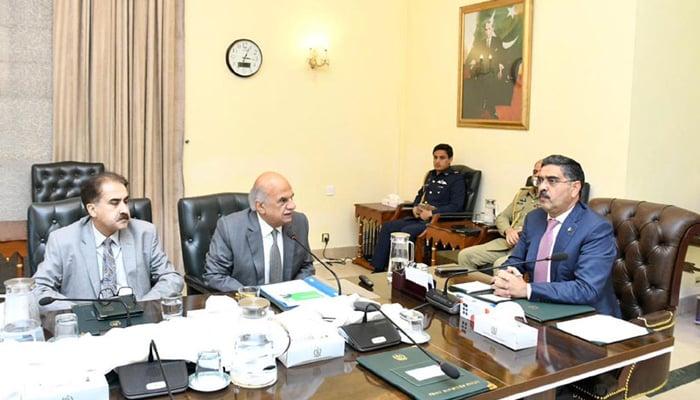SIFC identifies 20 projects to woo foreign investors
It has also been considered to hold study to explore availability of lithium in Pakistan and joint investment in Afghanistan
ISLAMABAD: The much-trumpeted Special Investment Facilitation Council (SIFC) has so far identified and approved 20 projects for attracting multibillion-dollar investments from the Gulf states and others, out of which nine have been converted to the required template.
It has also been considered to hold a study to explore the availability of lithium in Pakistan and joint investment in Afghanistan.
The SIFC also decided to implement a plan for legislation for corporate contracts and cooperative farming on private land, such as provincial legislation to safeguard land rights and dispute resolution, establishing a special unit at the Security and Exchange Commission of Pakistan (SECP), special courts to settle disputes, tax holidays, incentives, and risk mitigation, special authorities at provincial levels, and pilot models at all provinces.
For contract farming, the legal landscape will have to be changed, including the Contract Act 1872, the Khyber Pakhtunkhwa Tenancy Act 1950 (Act No. XXV of 1951), the Punjab Tenancy Act 1887, the Balochistan Tenancy Ordinance 1978, the Sindh Tenancy (Amendment) Act 2013, and amendments required to safeguard land rights and dispute resolution.
The identified projects included Saudi Aramco Refinery, TAPI Gas Pipeline, Thar Coal Rail Connectivity, hydropower projects of 245 MW in Gilgit-Baltistan, handing over of 85,000 acres of land to a single investor, the establishment of cloud infrastructure, and telecom infrastructure deployment.
Later, the SIFC was told that project-specific teasers for all projects approved by the apex committee are ready, including technical and feasibility information, excluding the Thar Coal Link. The SIFC also decided to hire a financial adviser to work out modalities for offering stakes to Saudi Arabia in Reko Diq.
It is also under consideration for holding talks between Balochistan and Pakistan Petroleum Limited (PPL) to resolve the lead-zinc mining lease issue in the Khuzdar district. The PPL may consider floating the Barite-Lead-Zinc project to potential investors.
The SIFC, jointly run by civilian and military’s top brass, has so far taken the decision that 3-5 investment propositions would be short-listed in the priority sectors for investment with complete analysis, technical and financial viability, information on duty structure both at federal and provincial levels, availability of required infrastructure, procurement method preferably G2G (government to government) or open bidding, and crystal clear classification as short, medium, and long-term projects.
The Ministry of National Food Security and Research (MNFSR) identified four projects, the Ministry of Petroleum two projects, the Ministry of Information Technology four projects, and the Power Division 10 projects. So in total, 20 projects were identified, out of which the Apex Committee of SIFC approved nine projects for presentation to potential investors in the Gulf States. “The SIFC has decided to hire best-in-class consulting firms to appraise and evaluate these twenty projects to gauge whether the interest of potential investors could be lured or not before floating in front of investors,” said the official. The SIFC also approved the shortlisted projects in a uniform teaser format supported by a bankable feasibility study in the agriculture sector, including a plan to offer 85,000 acres to a single investor. Corporate farming in Cholistan includes 50,000 acres, establishment of a corporate dairy farm on 15,000 acres for 30,000 animals, establishment of a corporate feedlot farm on 10,000 acres for 100,000 animals, and the establishment of a corporate camel farm on 10,000 acres for 15,000 animals.
-
 Savannah Guthrie Expresses Fresh Hope As Person Detained For Questioning Over Kidnapping Of Nancy
Savannah Guthrie Expresses Fresh Hope As Person Detained For Questioning Over Kidnapping Of Nancy -
 ByteDance Suspends Viral Seedance 2.0 Photo-to-voice Feature: Here’s Why
ByteDance Suspends Viral Seedance 2.0 Photo-to-voice Feature: Here’s Why -
 Tom Hanks Diabetes 2 Management Strategy Laid Bare
Tom Hanks Diabetes 2 Management Strategy Laid Bare -
 Bad Bunny Wins Hearts With Sweet Gesture At Super Bowl Halftime Show
Bad Bunny Wins Hearts With Sweet Gesture At Super Bowl Halftime Show -
 Why Angelina Jolie Loves Her 'scars' Following Double Mastectomy
Why Angelina Jolie Loves Her 'scars' Following Double Mastectomy -
 ‘World Is In Peril’: Anthropic AI Safety Researcher Resigns, Warns Of Global Risks
‘World Is In Peril’: Anthropic AI Safety Researcher Resigns, Warns Of Global Risks -
 Meghan Markle Receives Apology As Andrew Puts Monarchy In Much Bigger Scandal
Meghan Markle Receives Apology As Andrew Puts Monarchy In Much Bigger Scandal -
 Catherine O’Hara Becomes Beacon Of Hope For Rectal Cancer Patients
Catherine O’Hara Becomes Beacon Of Hope For Rectal Cancer Patients -
 Nancy Guthrie: Is She Alive? Former FBI Director Shares Possibilities On 10th Day Of Kidnapping
Nancy Guthrie: Is She Alive? Former FBI Director Shares Possibilities On 10th Day Of Kidnapping -
 Siemens Energy Profit Surges Nearly Threefold Amid AI Boom For Gas Turbines, Grids
Siemens Energy Profit Surges Nearly Threefold Amid AI Boom For Gas Turbines, Grids -
 TikTok's ByteDance To Develop Advance AI Chips With Samsung
TikTok's ByteDance To Develop Advance AI Chips With Samsung -
 Princess Beatrice, Eugenie In Dilemma As Andrew, Fergie Scandal Continues
Princess Beatrice, Eugenie In Dilemma As Andrew, Fergie Scandal Continues -
 Tumbler Ridge School Shooting Among Canada’s Deadliest — Here’s Where It Ranks
Tumbler Ridge School Shooting Among Canada’s Deadliest — Here’s Where It Ranks -
 Suspect Detained As Authorities Probe Nancy Guthrie’s Abduction
Suspect Detained As Authorities Probe Nancy Guthrie’s Abduction -
 Tumbler Ridge Tragedy: Nine Killed, 25 Injured After School Shooting In British Columbia
Tumbler Ridge Tragedy: Nine Killed, 25 Injured After School Shooting In British Columbia -
 FDA Sends 'refusal-to-file' To Moderna Over New Flu Vaccine
FDA Sends 'refusal-to-file' To Moderna Over New Flu Vaccine




